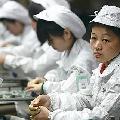
Shi Chuan, chinaworker.info
Due to infamous sweatshop working conditions, serial suicides and accidental deaths, the largest global OEM corporation (original equipment manufacturer), Foxconn, is shifting its manufacturing bases from China’s southeastern coast to inland provinces. Until now, Foxconn has already set up or is planning factories or its own industrial zones in Henan, Hebei, Shanxi, Shaanxi, Sichuan and Hubei provinces. According to the company’s PR department it will downsize its manufacturing base in Shenzhen from 500,000 employees to below 200,000 workers in next 3-5 years, but at the same time it will increase its labour force in inland provinces from the current 100,000 to one million.
Certain provincial and local bureaucracies are keen to attract Foxconn’s investment, both for the government’s account and their own personal interests. They have coaxed big capitalists like Foxconn with special privileges including exemption from local tax, free/low-cost land for development, guaranteed supply of labour force and preferential security protection against workers’ struggle and threats from organised crime or racketeering. For example, the Henan provincial government has provided Foxconn with 10 square kilometers of ready-made land at low cost on the outskirts of Zhengzhou, the provincial capital. Foxconn is planning to build a multi-functional industrial zone with 300,000 employees in next 5 years. The Henan government has already over the last four months mobilised an over 60,000-strong labour force for Foxconn’s production and construction needs.
In order to meet their promises to Foxconn, the Henan and Zhengzhou governments have compelled students in technical schools and polytechnics to work for Foxconn factories for terms of between three months to one year in the name of “internship”. (Trainee periods are usually required for technical school and polytechnics students, but not compulsory working for specific factories. Usually, schools will ask students to seek their own internships). But recently in Henan, technical schools and polytechnics have received orders from governmental education departments to arrange for students to work on Foxconn’s assembly line during their trainee period, no matter what major they are studying, even including students studying in subjects such as media, animation, arts and business operations. If students refuse to take this “internship option”, school and teachers are threatening they will not graduate or lose the chance to enter higher qualification courses. This is creating anger and dissatisfaction among students and their parents.
Indeed, last September in Wuhan, several schools and colleges also organised 7,000-8,000 students to undergo similar “internship” with support from local governments. In Shanxi Province, the local government also organised around 10,000 students on a similar scheme. On 16 September, however, around 2,000 students from the Taiyuan Steel Technical School refused to sign internship contracts issued by Foxconn with strict terms. Some students clashed violently with Foxconn security guards after this, which resulted in the Shanxi local government abandoning the “internship” project.
Furthermore, in Sichuan province, local governments are also actively recruiting workers for Foxconn in the name of “increasing peasants’ income”. The government has required hundreds of low-level villages and towns to assign ten young workers per month to take part in job interviews with Foxconn. If they cannot offer enough available candidates for job interviews, they still need to send even employed individuals and even rank-and-file civil servants to pose as job seekers. The reason is straightforward enough: if an official can reach the targets for supplying candidates for Foxconn’s interviews, he or she can get a cash incentive.
This kind of so-called “cooperation” between local government and businesses is becoming popular in China. Many governmental education departments and schools are involved as a business venture to make profits. They charge an “agency fee” or “management fee” from the capitalists while only giving minimal cash allowance to students to live on. In extreme cases, students receive no payment while they are working as a normal worker for 10-12 hours per day in a “sweatshop” factory. They even have to use their own money for daily living expenses and food.
For bosses of these factories this is also a “good deal”. Student trainees are usually cheaper than formal contracted workers, even if the company needs to pay extra management fees to schools and governments. Furthermore, it is easier to control these young people since they lack employment experience and are under dual management, not just by the company, but by their teachers and schools. If they want to quit the job or take strike action against management, they firstly will face the threat of “no graduation, no diploma” from their schools. Last May, part of the workforce involved in the Honda strike in Foshan were also “student trainees” from technical schools.
This is the logical result of the so-called “market-orientation of education” and “sweatshop competition” in China. Capitalists, like the infamous Foxconn, and local corrupt officials benefit from this situation, while students and young workers have to pay the price.
Chinaworker.info campaigns against sweatshop factories and for trade union and workers’ rights. We are opposed to the bureaucratic dictatorship, privatisation of public services, capitalist restoration and corruption in China. We have been actively involved in campaigning against Foxconn’s exploitation since earlier this year when the scandals involving young workers’ suicides became world news.
We hereby call for:
- Support for students and workers in inland provinces to fight against exploitation and repression from capitalists and bureaucracies
- Unity of student training staffs and formal contracted workers
- No to compulsory training/internship
- Support grassroots independent trade unions and student unions, democratically founded and controlled from below by workers and students.

Be the first to comment